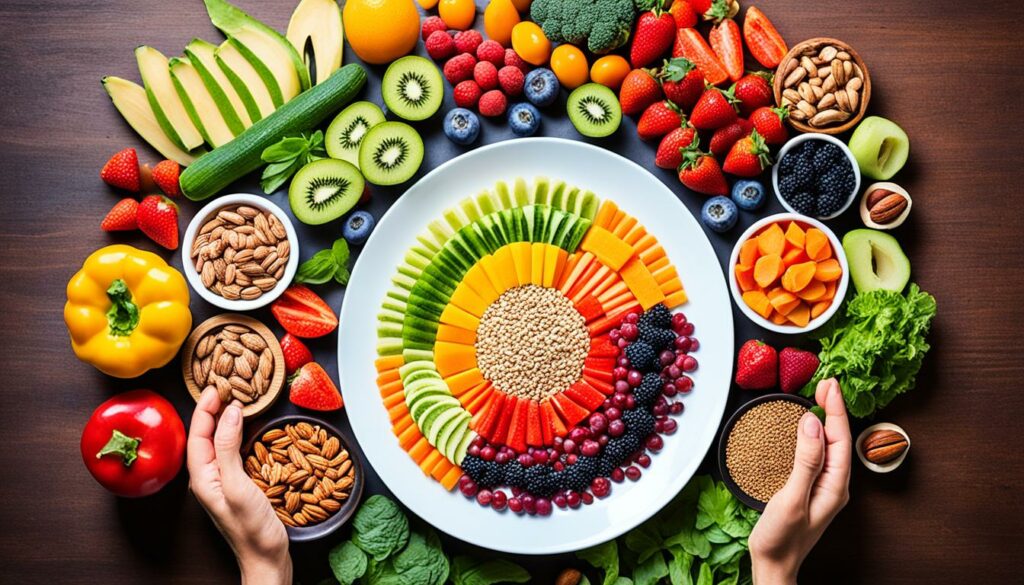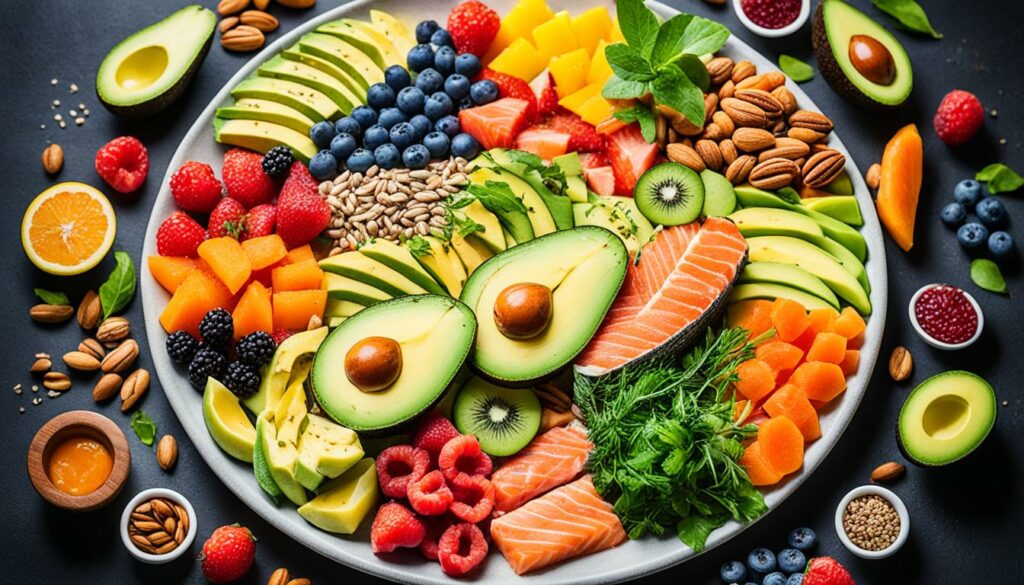Healthy Teen Tips: Lose Stomach Fat Effectively
Welcome to our comprehensive guide on healthy weight loss tips specifically designed for teenagers. If you’re looking to lose stomach fat and improve your overall health, you’ve come to the right place. It’s essential to approach weight loss in a safe and sustainable way, especially during your teenage years when your body is still growing and developing.
Teens often face unique challenges when it comes to weight loss, but with the right strategies and support, it’s entirely achievable. In this article, we will provide you with 16 proven tips that will help you shed excess stomach fat effectively and keep it off in the long run.
Key Takeaways:
- Set healthy and realistic goals focused on improving your overall health rather than solely on body weight.
- Limit your intake of sweetened beverages, such as sodas and energy drinks, as they are loaded with added sugars that can contribute to weight gain.
- Increase your overall daily activity by finding enjoyable physical activities that you can incorporate into your routine.
- Eat nutrient-dense foods that provide essential nutrients for your growing body and help keep you feeling full and satisfied.
- Include healthy fats in your diet, such as nuts, seeds, avocados, and fatty fish, as they are essential for proper growth and development.
These are just a few key tips to get you started on your weight loss journey. Now, let’s dive into each of these strategies in more detail to help you achieve your goals and experience the numerous benefits of a healthier, more active lifestyle.
Set Healthy, Realistic Goals

When it comes to losing weight and improving body image, it’s crucial to set healthy and realistic goals. Instead of solely focusing on the number on the scale, prioritize overall health and well-being. By making sustainable changes to your diet and increasing physical activity, you can achieve long-term success in achieving your weight loss goals.
Having healthy role models, such as athletes or fitness enthusiasts, can inspire and motivate you to make positive changes. Surround yourself with supportive friends and family members who encourage and uplift you on your journey. Seek out educational resources, such as books or online articles, that provide valuable information on nutrition and exercise.
Remember, successful weight loss is not about quick fixes or drastic measures. It’s about making gradual and sustainable changes that become a part of your lifestyle. By setting realistic goals and incorporating healthy habits, you can transform your body and improve your overall well-being.
Take a look at the table below for practical tips on improving your diet and increasing physical activity:
| Improving Your Diet | Increasing Physical Activity |
|---|---|
| Choose nutrient-dense foods | Find an activity you enjoy |
| Incorporate more fruits and vegetables | Join a sports team or club |
| Limit processed foods and added sugars | Take walks or bike rides |
| Stay hydrated with water | Try dance or aerobics classes |
| Practice portion control | Take the stairs instead of the elevator |
| Include lean protein sources | Do strength training exercises |
| Plan and prepare meals in advance | Make physical activity a daily habit |
By incorporating these tips, you can create a well-rounded approach to weight loss that focuses on improving your diet and increasing physical activity. Remember to consult with a healthcare professional or registered dietitian before making any significant changes to your diet or exercise routine.
By setting realistic goals and implementing healthy changes to your diet and lifestyle, you can achieve long-term success in losing weight and improving your body image. Stay committed, stay motivated, and embrace the journey towards a healthier and happier you.
Cut Back on Sweetened Beverages

When it comes to weight loss, one simple but highly effective strategy for teens is to cut back on sweetened beverages. Sodas, energy drinks, and other sweetened beverages are often loaded with added sugars, which can lead to weight gain and increase the risk of various health conditions.
According to a study from [Source Name], the consumption of sweetened beverages is strongly associated with weight gain in teens. By reducing their intake of these sugary drinks, teens can significantly reduce their calorie intake and promote weight loss.
Not only are sweetened beverages high in added sugars, but they also lack nutritional value. By replacing these drinks with healthier alternatives such as water, unsweetened tea, or infused water, teens can decrease their sugar intake and improve their overall health.
It’s important for both teens and their parents to be aware of the negative impact of sweetened beverages on weight and health. By encouraging and supporting each other in making healthier beverage choices, families can make significant strides in achieving and maintaining a healthy weight.
Add in Physical Activity
Engaging in physical activity is essential for weight loss and overall well-being in teenagers. Incorporating regular exercise not only helps in shedding excess pounds but also offers numerous other health benefits. By increasing overall daily activity, teens can boost their metabolism, build muscle mass, and improve their mood.
It’s important for teenagers to find physical activities they enjoy, as this increases the likelihood of maintaining a consistent routine. Whether it’s hiking, biking, dancing, or participating in team sports, finding an activity that brings joy and excitement can make exercise more enjoyable and sustainable.
Regular physical activity plays a significant role in weight loss by increasing calorie expenditure. It helps burn fat, build lean muscle mass, and boost metabolism. As a result, teens will not only shed unwanted pounds but also develop a toned physique.
In addition to its impact on weight loss, physical activity has a positive effect on mental well-being. Engaging in exercise releases endorphins, also known as the “feel-good” hormones, which can improve mood and boost overall happiness. Studies have shown that regular exercise can contribute to reducing symptoms of depression and anxiety in teenagers.
“Physical activity is crucial for weight loss and overall well-being in teenagers. By increasing overall daily activity, teens can boost their metabolism, build muscle mass, and improve their mood.”
Encouraging teens to prioritize physical activity not only assists in achieving weight loss goals but also sets the foundation for a lifetime of healthy habits. Incorporating exercise into daily routines can enhance self-esteem, increase energy levels, and improve overall quality of life.
| Benefits | Description |
|---|---|
| Weight loss | Regular exercise helps burn calories and shed excess pounds. |
| Muscle mass | Physical activity promotes muscle growth and strength. |
| Mood improvement | Exercise releases endorphins, improving mood and reducing symptoms of depression. |
| Increased energy | Regular physical activity boosts energy levels and reduces fatigue. |
| Improved overall well-being | Engaging in exercise enhances self-esteem and contributes to a higher quality of life. |
Fuel Your Body With Nourishing Foods

When it comes to effective weight loss for teens, fueling the body with nutrient-dense foods is key. These foods not only provide essential nutrients for growing bodies but also help promote satiety, aiding in weight management. Teenagers have higher nutrient needs due to their growth and development, making it crucial to prioritize nutrient density in their diet.
Essential Nutrient-Dense Foods
Teenagers should focus on incorporating the following nutrient-dense foods into their meals:
- Vegetables: Packed with vitamins, minerals, and fiber, vegetables should be a staple in every teen’s diet. Encourage a variety of colorful options like dark leafy greens, cruciferous vegetables, and vibrant bell peppers.
- Fruits: Another excellent source of vitamins, minerals, and fiber, fruits provide natural sugars that satisfy cravings and provide sustained energy throughout the day.
- Whole Grains: Opt for whole grains like quinoa, brown rice, and whole wheat bread. These complex carbohydrates provide sustained energy and additional fiber.
- Healthy Fats: Include sources of healthy fats like avocados, nuts, seeds, and olive oil. These fats are essential for brain function, hormone production, and overall cell health.
- Wholesome Protein Sources: Choose lean meats, poultry, fish, legumes, and tofu for adequate protein intake. Protein is not only important for muscle growth but also keeps you feeling full and satisfied.
The Importance of Fiber and Protein
Incorporating fiber and protein-rich foods into meals is particularly beneficial for weight loss in teens. Fiber adds bulk to meals, promoting feelings of fullness and reducing the likelihood of overeating. Protein, on the other hand, helps build and repair tissues, supports muscle growth, and enhances satiety.
Here is an example of a day’s worth of meals that prioritizes nutrient density, fiber, and protein:
| Meal | Food Choices |
|---|---|
| Breakfast | Greek yogurt with berries and a sprinkle of chia seeds |
| Lunch | Grilled chicken salad with mixed greens, tomatoes, cucumbers, avocado, and a dressing made with olive oil and vinegar |
| Snack | Apple slices with almond butter |
| Dinner | Grilled salmon with quinoa and steamed broccoli |
| Snack | Carrot sticks with hummus |
Eating nourishing foods not only supports weight loss but also contributes to overall health and well-being. By making conscious choices to fuel their bodies with nutrient-dense options, teens can achieve their weight loss goals while ensuring proper growth and development.
Don’t Avoid Fat

When it comes to teen nutrition, healthy fats are often misunderstood. Many teens believe that cutting out fat is the key to losing weight, but the truth is, fat is an essential nutrient for proper growth and development. Restricting fat intake too much can negatively impact growth and overall health.
Instead of drastically reducing fat consumption, it’s important for teens to focus on swapping unhealthy fat sources for healthy ones. By making simple changes to their diet, teens can incorporate more nourishing fats into their meals.
Examples of healthy fats that promote weight loss and provide numerous health benefits for teens include:
- Nuts and seeds
- Avocados
- Olive oil
- Fatty fish like salmon and trout
These sources of healthy fats are rich in omega-3 fatty acids, which can support brain health, reduce inflammation, and promote a healthy body weight. Including these healthy fats in a balanced diet can help teens achieve their weight loss goals while still getting the essential nutrients their bodies need to thrive.
It’s important to note that not all fats are created equal. Unhealthy fats, such as trans fats and saturated fats, should be limited as they can increase the risk of heart disease and other health conditions. By choosing healthy fats over unhealthy ones, teens can make positive changes to their diet while still enjoying delicious and satisfying meals.
Additional Information
“Including healthy fats in a teen’s diet is crucial for their overall health and well-being. It’s important to focus on consuming the right types of fats, like those found in nuts, avocados, and olive oil, to support growth and development while maintaining a healthy weight.” – Dr. Sarah Johnson, Teen Nutrition Expert
| Healthy Fats | Unhealthy Fats |
|---|---|
| Nuts and seeds (almonds, walnuts, chia seeds) | Trans fats (found in processed snacks and fried foods) |
| Avocados | Saturated fats (found in fatty meats, full-fat dairy products) |
| Olive oil | Margarine |
| Fatty fish (salmon, trout, tuna) | Butter |
Limit Added Sugars
Teens often consume foods that are high in added sugars, which can have a significant impact on their appetite and overall health. These high-sugar foods can lead to fluctuations in appetite, causing teens to overeat throughout the day.
Not only do high-sugar foods affect appetite, but they can also have negative effects on academic performance and mood in teens. Consuming excessive amounts of added sugars can lead to difficulty concentrating, decreased energy levels, and impaired cognitive function.
Cutting back on added sugars is essential for improving health and promoting effective weight loss in teens. By reducing the consumption of foods and beverages with high added sugar content, teens can better regulate their appetite, enhance their energy levels, and improve their overall academic performance.
Avoid Fad Diets
Fad diets, although tempting for quick weight loss, can have detrimental effects on both physical and mental health. These diets often promote extreme calorie restriction, eliminate entire food groups, or rely on questionable supplements, leading to imbalanced nutrition and potential nutrient deficiencies.
“Quick-fix” diets usually fail to provide long-term results and may even result in weight gain once the diet is abandoned. They can also lead to a cycle of yo-yo dieting, which can negatively impact the body’s metabolism and make future weight loss more challenging.
The importance of slow, consistent weight loss cannot be emphasized enough. Instead of choosing fad diets, teens should focus on sustainable lifestyle changes that promote healthy habits and gradual progress. By making small, realistic adjustments to their eating and exercise habits, teens can achieve steady weight loss while maintaining proper nutrition and overall well-being.
“It’s crucial for teens to understand that weight loss is not just about shedding pounds but about establishing a healthy relationship with food and their bodies,” says Dr. Elizabeth Brown, a registered dietitian. “Consistency and patience are key to achieving their goals.”
Choosing a balanced and nutritious approach to weight loss allows teens to develop lifelong healthy habits and maintain a healthy weight in the long run.
To illustrate the potential dangers of fad diets, consider the following table:
| Fad Diet | Detrimental Effects |
|---|---|
| Keto Diet | Restricts important food groups, such as fruits and whole grains, leading to nutrient deficiencies and potential harm to kidney function. Can cause negative side effects, such as nausea, fatigue, and constipation. |
| Juice Cleanse | Lacks essential proteins, fats, and fiber. Can lead to nutrient deficiencies, muscle loss, and slowed metabolism. Increases the risk of blood sugar imbalances and may promote disordered eating patterns. |
| Cabbage Soup Diet | Severely restricts calorie intake, causing a short-term weight loss due to water loss. Fails to provide adequate nutrition and can lead to fatigue, weakness, and nutrient deficiencies. |
Note: The table is for illustrative purposes only and does not include an exhaustive list of fad diets or their associated effects.
By avoiding fad diets and embracing a holistic approach to weight loss, teens can achieve long-lasting and sustainable results. Slow and consistent progress, combined with healthy eating, regular physical activity, and positive lifestyle changes, is the key to achieving and maintaining a healthy weight for life.
Eat Your Veggies
When it comes to weight loss for teens, including vegetables in meals is crucial. Not only are vegetables low in calories, but they also provide essential nutrients that support overall health and weight loss. Let’s explore the importance of vegetables for weight loss and how they contribute to satiety.
Vegetables are packed with fiber, which plays a key role in weight management. Fiber adds bulk to your meals, making you feel full and satisfied for longer periods. This helps curb cravings and prevents overeating, ultimately aiding in weight loss. Additionally, fiber keeps your digestive system functioning properly, promoting regular bowel movements and reducing bloating.
Another benefit of vegetables is their high water content. Many vegetables, such as cucumbers and lettuce, have a high water percentage, which contributes to their low calorie density. This means you can eat a larger quantity of vegetables while consuming fewer calories, making them an excellent choice for weight loss.
Incorporating a variety of vegetables into your meals ensures that you’re getting a wide range of nutrients necessary for overall health. Different vegetables provide different vitamins, minerals, and antioxidants, all of which play important roles in supporting various bodily functions.
- Include a side salad with leafy greens and colorful vegetables with your meals.
- Add vegetables such as spinach, bell peppers, and mushrooms to omelets or scrambled eggs for a nutritious breakfast.
- Swap traditional pasta with spiralized zucchini or spaghetti squash for a low-carb, veggie-packed alternative.
- Add roasted vegetables like carrots, broccoli, and cauliflower to your favorite dishes.
By incorporating vegetables into your meals, you not only boost your weight loss efforts but also improve your overall health. Don’t be afraid to experiment with different vegetables and cooking methods to find what you enjoy the most. Let nature’s bounty be your secret weapon on your weight loss journey.
Mindful Eating Practices
Practicing mindful eating can have a significant impact on developing a better relationship with food and maintaining a healthy body weight for teens. Many teenagers tend to eat their meals and snacks while distracted, which can lead to overeating and less mindful food choices.
By incorporating mindful eating practices into their daily routine, teens can cultivate a more mindful approach to their food consumption. This includes:
- Eating slowly and savoring each bite
- Chewing food thoroughly
- Paying attention to hunger and fullness cues
- Engaging the senses by noticing the flavors, textures, and smells of food
- Avoiding distractions such as smartphones or television during meals
- Being present and focusing on the experience of eating
These practices can foster a sense of mindfulness and awareness, helping teens to develop a better understanding of their body’s needs and to make healthier and less impulsive food choices.
When teens eat mindfully, they are more likely to listen to their body’s signals and eat until they are satisfied rather than continuing to eat out of habit or boredom. This can contribute to a better overall relationship with food and healthier eating habits in the long run.
Conclusion
The journey to losing stomach fat as a teenager requires a combination of teen weight loss strategies that encompass healthy eating, regular physical activity, and mindful habits. By setting realistic goals and making sustainable changes, teens can achieve effective weight loss and experience an improved quality of life. It’s essential for parents to support and encourage their teens throughout this process.
Implementing healthy teen weight loss strategies is crucial for long-term success. Teens should focus on making nutritious food choices that fuel their bodies with essential nutrients and promote satiety. Including a variety of vegetables, fruits, whole grains, and lean proteins in their diet can help them achieve their weight loss goals.
Physical activity also plays a vital role in teen weight loss. Engaging in regular exercise not only helps burn calories and build muscle mass but also improves mood and overall well-being. Finding activities that teens enjoy, whether it’s playing a sport, dancing, or joining a fitness class, can make exercise more enjoyable and sustainable.
Finally, practicing mindful habits can contribute to effective weight loss. Encouraging teens to eat mindfully, savoring each bite and paying attention to hunger and fullness cues, can prevent overeating and promote a healthier relationship with food. Additionally, reducing the consumption of sugary beverages and opting for water or unsweetened alternatives can further support weight loss efforts.
FAQ
What should be my goal when it comes to losing weight as a teen?
It’s important to have realistic weight and body-image goals. Instead of solely focusing on body weight, the focus should be on improving health by improving diet and increasing physical activity.
How can cutting back on sweetened beverages help with weight loss?
Sweetened beverages, such as sodas and energy drinks, are loaded with added sugars, which can lead to weight gain and increased health risks. Cutting back on these unhealthy drinks can support weight loss.
How does physical activity contribute to weight loss in teens?
Engaging in regular physical activity not only helps with weight loss but also boosts mood and decreases depressive symptoms in teens. Teens can increase their overall daily activity by finding an activity they enjoy.
What kind of foods should teens focus on to support weight loss?
Choosing nutrient-dense foods, such as vegetables, fruits, whole grains, healthy fats, and wholesome protein sources, can support weight loss. These foods provide essential nutrients for growing bodies and can help with satiety.
Is it important for teens to include fats in their diet?
Yes, healthy fats are essential for proper growth and development in teens. Instead of drastically reducing fat intake, teens should focus on swapping unhealthy fat sources for healthier ones like nuts, seeds, avocados, olive oil, and fatty fish.
Why is limiting added sugars important for weight loss in teens?
Many teens tend to consume foods high in added sugars, which can lead to fluctuations in appetite and overeating throughout the day. High-sugar foods can also negatively impact academic performance and mood in teens.
Are fad diets effective for weight loss in teens?
Fad diets rarely work long term and can be harmful to health. Overly restrictive diets are hard to stick to and may slow down weight loss. Instead, teens should aim for slow, consistent, and healthy weight loss over time.
How can including vegetables in meals promote weight loss in teens?
Vegetables are packed with important nutrients, fiber, and water, which can help with satiety and prevent overeating. Consuming a variety of vegetables is important for overall health and weight loss.
Can practicing mindful eating help with weight loss in teens?
Yes, practicing mindful eating can help develop a better relationship with food and regulate weight. Mindful eating practices, such as eating slowly and chewing food thoroughly, can promote a healthy body weight and decrease impulsive food choices.
What are some effective strategies for teen weight loss?
The journey to losing stomach fat as a teenager requires a combination of healthy eating, regular physical activity, and mindful habits. By setting realistic goals, cutting back on sugary beverages, being physically active, and fueling the body with nourishing foods, teens can achieve effective weight loss and experience an improved quality of life.







